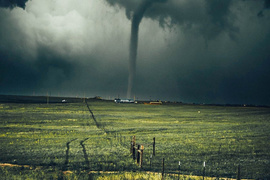The weather experts are really tired of people getting mad at them.
“There was no warning. No sirens. No weather radio alerts,” read a Southern Living article titled “Flowers in the Storm.” The Birmingham, Alabama–based magazine published the piece on Jan. 26, the day after an EF-3 tornado carved a 9½-mile path through Central Alabama, destroying buildings and killing at least one person. While the piece might have meant to help readers process the alarming destruction, it also aired the erroneous claim that there were “no television meteorologist barking ‘You need to get to your safe place NOW.’ ”
James Spann, chief meteorologist at ABC 33/40 in Birmingham, was quick to refute it.
“This narrative discredits the entire weather enterprise,” he wrote on Facebook. “A tornado watch was issued 4 and a half hours before the tornado, and the warning allowed 8-10 minutes for people in Fultondale to get in a safe place.”
While some people get mad when they miss weather warnings, others get mad when they do hear them. In April 2019, Atlanta meteorologists felt the public’s ire firsthand when they cut into the broadcast of the final round of the Masters golf tournament with live updates on a round of severe thunderstorms and possible tornadoes moving through the area—updates that could have also affected the Masters, hosted just east of Atlanta in Augusta, Georgia.
Viewers took to Twitter to complain, including one user who commented: “The only touchdown I care about is in football. Go back to #TheMasters.” Others went so far as to issue death threats.
Another likely contributor is our culture of individualism—our preference for personal freedoms, even if those freedoms could lead to self-detriment.
The COVID-19 anti-masker movement is one such example, as a 2020 paper titled “Individualism During Crises” points out.
Individualism can hamper collective action, the authors write, as well as affect risk taking. And risk taking, according to a 2016 study in the International Journal of Disaster Risk Reduction on how people respond to tornado warnings, influences how people rely on, understand, and trust tornado alerts.
For example, the study finds that men tend to expose themselves to greater risk than women because of traits including high self-belief and a fear of external influences undermining their authority. This leads to a distrust of tornado warnings, failure to take shelter, and dismissal of the alerts entirely, write the authors.
And if an individual is more inclined to depend on their own instincts over a meteorologist’s, they’re probably going to view the weatherperson’s advice as a nuisance. Ultimately, this mindset may increase the potential for being killed.
Though there could be a number of contributing factors, U.S. natural hazard statistics show that more male lives (generally double or more) than female have been claimed by severe weather every year since at least the 1990s.


Enjoy being online again!
Welcome to the community of good people who base their values on evidence and appreciate civil discourse - the social network you will enjoy.Create your free account
Enjoy being online again!
Welcome to the community of good people who base their values on evidence and appreciate civil discourse - the social network you will enjoy.Create your free account
Share this post
Related Groups More
World Music
1329 members
Categories
Agnostic does not evaluate or guarantee the accuracy of any content. Read full disclaimer.






